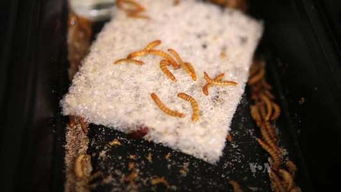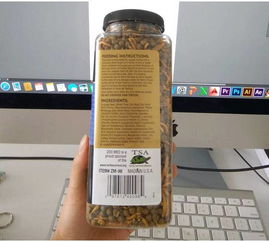
Can Mealworms Bite?
Mealworms, those fascinating and often misunderstood creatures, have sparked curiosity among many. One of the most common questions that arise is whether these insects can bite. In this detailed exploration, we delve into the various aspects of mealworm behavior, their anatomy, and the likelihood of them biting you.
Understanding Mealworms

Mealworms are the larval stage of the darkling beetle, Tenebrio molitor. They are commonly used as food for reptiles, birds, and fish due to their high protein content. Despite their popularity, many people are unaware of their behavior and whether they pose a threat to humans.
Can Mealworms Bite?

So, can mealworms bite? The answer is not straightforward. While mealworms do have mouthparts capable of biting, they are not aggressive and typically do not bite unless provoked. Their primary diet consists of grains, seeds, and other plant materials, which they consume by grinding them with their mandibles.
Mealworm Anatomy

Mealworms have a segmented body, with a head, thorax, and abdomen. The head contains the mouthparts, which are designed for chewing. However, their mouthparts are not sharp or strong enough to cause significant harm to humans. The mandibles are small and flat, resembling a pair of pliers, and are used to crush and grind food.
Behavioral Factors
Mealworms are generally docile and do not have a natural instinct to bite humans. However, there are a few situations where they might bite. If they feel threatened or are handled roughly, they may attempt to bite as a defense mechanism. Additionally, if they are overcrowded or stressed, they might exhibit aggressive behavior, including biting.
Handling Mealworms
When handling mealworms, it is essential to be gentle and avoid causing them stress. They are delicate creatures, and rough handling can lead to injury or aggression. If you need to handle them, use a pair of tweezers or a soft cloth to pick them up. Avoid squeezing or dropping them, as this can provoke a bite.
Preventing Bites
To minimize the risk of being bitten by mealworms, follow these tips:
| Tip | Description |
|---|---|
| Handle Gently | Use tweezers or a soft cloth to pick up mealworms, avoiding rough handling. |
| Avoid Overcrowding | Keep mealworms in a well-ventilated container with enough space to prevent stress and aggression. |
| Keep Them Fed and Hydrated | Provide a consistent diet and fresh water to maintain their health and reduce stress. |
Conclusion
In conclusion, while mealworms have the capability to bite, they are not aggressive and typically do not pose a threat to humans. By handling them gently and providing a suitable environment, you can minimize the risk of being bitten. These fascinating insects can be a valuable addition to your pet’s diet, as long as you understand their behavior and take appropriate precautions.







